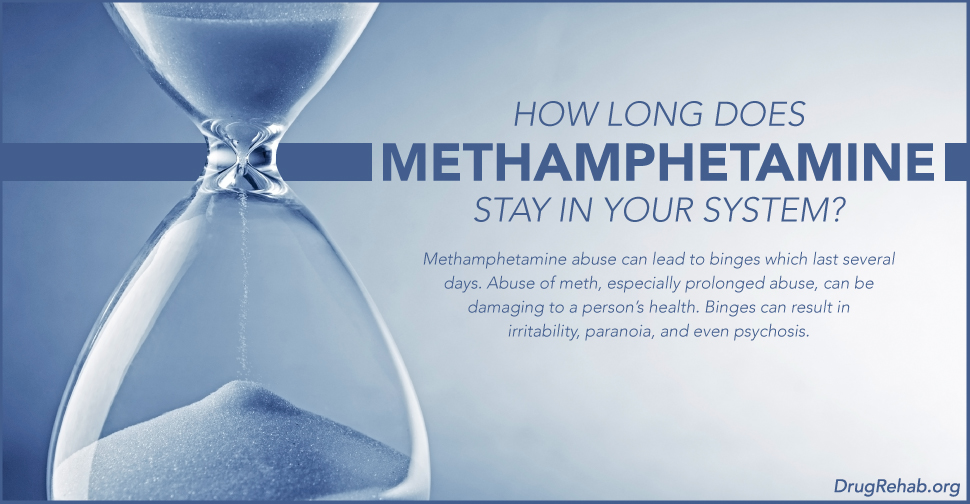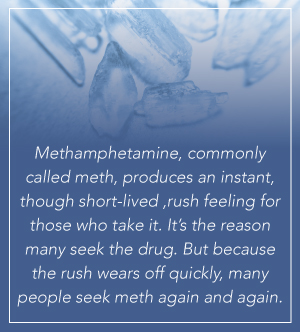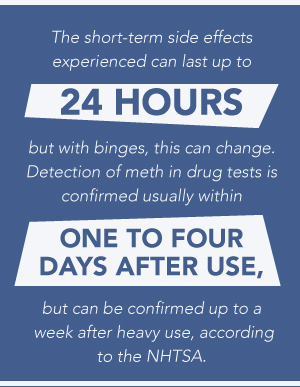
Methamphetamine abuse can lead to binges which last several days. Abuse of meth, especially prolonged abuse, can be damaging to a person’s health. Binges can result in irritability, paranoia, and even psychosis. Knowing how long methamphetamine stays in your system can be useful when meth abuse is suspected. Methamphetamine abuse and addiction are best treated under careful monitoring in an inpatient environment.
Methamphetamine, commonly called meth, produces an instant, though short-lived, rush feeling for those who take it. It’s the reason many seek the drug. But because the rush wears off quickly, many people seek meth again and again.

Drugs which produce an initial rush followed by a high (feeling of intense euphoria and increased activity) tend to be highly addictive. Meth is no exception. Yet the stages of meth abuse can be dangerous, especially for those who continually abuse the drug.
It may be helpful to know how long methamphetamine stays in your system if you believe someone you know is abusing the drug. Meth abuse leads to a number of risks, including dissociation of the mind and high risk of self-harm or harm to others (at worst). Treatment is the safest way to ensure those abusing meth find help to quit use of it.
Duration Of Meth In Your System
Research conducted on how long meth stays in the body often involves the blood-to-plasma ratio. This measures the amount of meth in the whole blood. Other measurements may examine only how much meth is in plasma, which can be misleading if concentrations of the drug differ between red blood cells and plasma.
Measures of meth in your system works like this, according to the National Highway Traffic Safety Administration (NHTSA):
- Peak blood methamphetamine concentrations:
- A few minutes after smoking or injecting
- Around 3 hours after taking orally
- Peak amphetamine concentrations (after broken down from methamphetamine):
- 12 hours
- Elimination half-life (time to meth concentration cut in half):
- Mean measure is 10.1 hours
- Range of 6.4 to 15 hours
For each dose of meth, it takes anywhere from two to 10 days to leave the body. This number can change though, depending on usage; the more meth abused, the longer it takes to leave the body.

The short-term side effects experienced can last up to 24 hours, but with binges, this can change. Detection of meth in drug tests is confirmed usually within one to four days after use, but can be confirmed up to a week after heavy use, according to the NHTSA.
The Stages Of The Meth High
- Initial rush:
- When a person abuses meth, he or she first experiences the rush, or the initial surge of euphoria. This feeling lasts from a few minutes up to 30 minutes.
- During that time, the person’s heart rate increases and other systems in the body escalate, including blood pressure, pulse, and metabolism.
- High:
- After the rush comes the high. According to DrugFreeWorld.org, “during the high the abuser often feels aggressively smarter and becomes argumentative, often interrupting other people and finishing their sentences.” This stage is often characterized by delusions.
- Delusions lead the person to focus solely on one small thing; the person may place high importance on small tasks, like repetitive motions (stroking something or wiping a surface). The high can last from four to 16 hours.
- Binge:
- People affected by meth abuse may take several doses in a row to ensure a string of continuous highs. This process, known as a binge, results in hyperactivity. When a person abusing meth goes on a binge, he or she can go for days without sleep or food.
- Binges can last three to up to 15 days, according to the Center for Abuse Substance Research (CESAR). The purpose of the binge is to continue the high and re-experience the rush. But each time a person injects or smokes meth, the rush is less potent, the high less effective, until neither is experienced at all.
- Tweaking:
- It is during the binge that a person abusing meth experiences the most dangerous stage of meth abuse: tweaking. After lack of sleep and food for days, and with a constant stream of meth in the system, a person becomes paranoid and irritable.
- Though this stage is plagued by intense craving for the rush and high, the person likely can’t get the desired effects because he or she has developed tolerance.
- Tweaking presents danger because it may result in violence which can lead to domestic disputes or criminal acts, or even car accidents.
- Tweaking is characterized by: eyes moving extremely fast, quivering voice, jerky movements.
Factors For Duration
Because many people who abuse meth engage in a binge, it is important to know how long meth stays in your system. A few things affect the duration of meth in the body, and include:
- Method of administration: smoked, injected, or swallowed. Smoking or injecting results in quick onset; taking orally results in slower onset.
- How many doses have been taken
- How long it has been since last dose
- How well it is metabolized: the state of your liver and kidneys
How Is Meth Metabolized?
The body immediately begins to metabolize meth, first breaking it down partly to amphetamine. Within a few hours, the body continues to break down the methamphetamine and amphetamine left in the bloodstream.

The liver and kidneys do their work filtering out the chemicals of meth, as does urination. In fact, as much as 30 to 54 percent of meth can leave the body through urine as “unchanged methamphetamine” and 10 to 23 percent as “unchanged amphetamine,” according to the NHTSA. The majority of meth leaves the body without metabolizing at all.
How Does Meth Affect Your Health?
In addition to being highly addictive, meth can cause damaging effects to your health. Psychological dependence can result because the rush effects are desirable: excitement, high energy, talkativeness. People who abuse meth may associate this time with increased abilities to perform or achieve tasks (part of the delusions they experience).
But taking high doses or prolonged abuse can lead to less desirable effects to your health. For example, chronic use can lead to: irritability, nervousness, paranoia, violent behavior and extreme depression. All of these symptoms can contribute to increased likelihood of self-harm or harm of others. Left untreated, prolonged meth abuse can trigger psychosis similar to schizophrenia.
Adverse health effects associated with long-term abuse may include:
- Meth mouth: tooth decay, cracked teeth, and gum disease
- Brain damage
- Breakdown of immune system
- Skin lesions (sores)
- High blood pressure
- Extreme weight loss
- Malnutrition
- Stroke
- Heart problems
- Lung disease
- Kidney or liver damage
- Overdose and death
How Do You Treat Methamphetamine Abuse?
Treatment for meth first involves detoxification (detox). This first necessary step allows chemicals acquired during abuse to leave the body. This process can be dangerous when performed alone. Inpatient rehab centers can provide the medical and professional support necessary to get through it.
After being assessed, you’ll get treatment for meth abuse and any co-occurring substance abuse disorders or mental health disorders. Meth abuse may be coupled with alcohol abuse or abuse of other depressants, and can be characterized by anxiety, depression, or psychosis. It is important to recognize and treat all co-occurring disorders to ensure the best chance at recovery.
Inpatient rehab centers can provide the mental and emotional support you’ll lack in outpatient treatment. Evidence-based treatment options and licensed medical staff make treatment in a rehab center the quality experience it should be—a chance to rebuild a life without meth.
Get Information About Treatment
When people we know are in the grips of addiction, it can be frightening. Methamphetamine binges can last for days, and if someone you know is experiencing this, you may not know what to do next. We can help get your loved one into treatment, and find a recovery plan that works. Contact us today at DrugRehab.org to learn more about treating meth addiction and the rehab center difference.
For More Information Related to “How Long Does Methamphetamine Stay In Your System?” Be Sure To Check Out These Additional Resources From DrugRehab.org:
- Meth Drug Rehab
- Signs Of Methamphetamine Psychosis
- How Do I Get My Loved One Into Rehab?
- A New Weapon in The Meth Crisis
- The Effects of Drugs and Alcohol on the Kidneys
Sources
Center For Abuse Substance Research—Methamphetamine
Drug Free World—The Stages Of The Meth Experience
National Highway Traffic Safety Administration—Methamphetamine (And Amphetamine)
National Institute On Drug Abuse—DrugFacts: Methamphetamine
National Institute On Drug Abuse—What Are The Long-Term Effects Of Methamphetamine Abuse?

